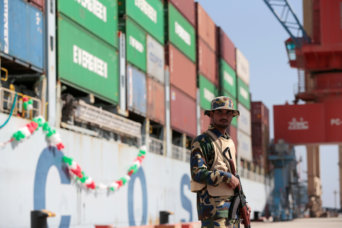- About
- Topics
- Story
- In-Depth
- Picks
- Opinion
- News
- Donate
- Signup for our newsletterOur Editors' Best Picks.Send
Read, Debate: Engage.
| located: | Pakistan, India, Afghanistan |
|---|---|
| editor: | Shadi Khan Saif |
After many years, the alleged Pakistani state-sponsored terrorism in its immediate neighbourhood is taking its toll on the country's own economy, pushing some 200 million inhabitants into poverty and despair.
For years, the ruling elite in Pakistan – mainly its powerful military – was brushing aside calls by the international community to shun ties to any terrorist groups involved in deadly assaults in neighbouring Afghanistan and India. But the calls were treated as unwanted and unfounded criticism by the so-called adversaries. As a response, citizens of Pakistan were fooled by the rhetoric that this was a part of a grand conspiracy against the country.
The vote at the Financial Action Task Force (FATF) Plenary last week to put Pakistan back on the “grey list”, subjecting it to direct monitoring and intense scrutiny by the International Co-operation Review Group (ICRG) on terror financing, has proved yet again that harbouring non-state actors for the foreign policy of so-called strategic depth would only result in further isolation.
If Pakistan did not learn from this vote, which was reportedly not opposed even by its closest allies, such as China, the Kingdom Saudi Arabia and Russia, then there is something terribly wrong with the makers and drivers of the policy in this South Asian country.
Under a “Compliance Document” Pakistan will now be required to furnish a fresh report to the International Co-operation Review Group (ICRG). Accordingly, the country will undergo a review at the next Plenary in June, when it would be presented a full action plan on how it is expected to crack down on terror groups banned by the UN Security Council.
The move was pushed by four nominating countries, the US, the UK, Germany and France. In mid-January, they had written to the FATF stating that even though Pakistan had an anti-money laundering/anti-terror funding regime in place, effectiveness of the implementation was inadequate.
After a previous round from 2012 to 2015 on this watch list, Pakistan opted for a multi-billion dollar IMF bailout, and ever since the country’s immense current account deficit has been further widening. The regional hostility has denied Pakistan over a billion dollars in trade with its western neighbour Afghanistan in past year-and-half. On the eastern side, India has always been portrayed and treated as the country's ‘arch-rival’. This leaves Pakistan to rely almost vulnerably on its mighty northern neighbour China, a country that has already swept the manufacturing sector in Pakistan, leaving the citizens of this increasingly isolated populous country jobless and desperate.
